
Ushering in a new era of transparency in Armenia
Ushering in a new era of transparency in Armenia
After two years of rapid progress by the Armenia EITI Multi-Stakeholder Group (MSG) and national secretariat, the country’s inaugural EITI Report was launched in Yerevan on 30 January. The report is the first comprehensive review of the Armenian mining sector, providing the public with insight into the revenues generated by the country’s extractives sector, as well as information on production volumes, jobs and social spending generated, and the legal owners behind the extractive companies.
Deputy Prime Minister Tigran Avinyan reflected on the high-level political commitment to the EITI in Armenia. “Armenia’s political transformation is ongoing, and the priority of our Government is the economic development and reforms aimed at improving the wellbeing of our people,” the deputy prime minister said to the EITI International Secretariat. “EITI Armenia, which has transparency, anti-corruption and participatory governance at its core, will assist our country to develop a responsible mining sector for the benefit of all citizens.”
By fostering cooperation between government, businesses, and civil society, the EITI has helped to introduce a new culture of dialogue in Armenia. The report is “a towering result of this persistent teamwork and a comprehensive review of the Armenian mining sector”, said Avinyan. “We hope that all these data will be of use to citizens, investors, researchers and officials, who will seize this opportunity and make an impact for a better Armenia. This is our ultimate goal.”
Mining is the fastest-growing sector of Armenia’s largely agricultural economy. In 2015, the mineral industry grew by 50.4% year-on-year and made up 16.7% of total industrial production of Armenia. The country’s mineral resources include iron, copper, molybdenum, lead, zinc, gold and silver. According to the World Bank, exports of these resources have brought in an estimated USD 500 million annually over the past five years, making mining a leading sector in terms of exports and foreign currency inflows. The sector employs between 7,500 – 9,000 people, mostly in rural communities near extraction sites (the stone quarrying sector is also a large employer, but not materially significant for EITI Reporting purposes) yet accounted for only 3.2% of GDP in 2017. Mining activities in the country have been marred by environmental issues over the years, which in a country largely dependent on its agriculture, has fostered some negative sentiment towards the industry among citizens.
Mining industry contribution to GDP

Prime Minister Nikol Pashinyan’s government came to power in 2018 after weeks of mass protests against corruption and cronyism. The former newspaper editor and member of parliament has emphasised curbing corruption and economic mismanagement, attracting foreign investment and reducing poverty as part of his political platform. Armenia ranked 105th on Transparency International’s 2018 Corruption Perception Index, which grades 180 countries and territories by their perceived levels of public sector corruption. Armenia achieved a score of 35, on a scale where zero is highly corrupt and 100 is very clean. The country’s mining sector is seen as a key sector for reform and EITI Armenia has been instrumental in highlighting governance issues and suggesting remedies, including establishing a beneficial ownership register. Armenia already discloses all mining contracts and is moving towards systematically disclosing data online.
While Armenia’s commitment to the EITI has been strong since it joined in 2017, the Pashinyan administration has given further impetus and support to the multi-stakeholder group (MSG), viewed as the first platform to convene government, companies and civil society stakeholders to discuss the management of the mining sector. Producing the first EITI Report allowed the different stakeholders to become informed of each other’s concerns and priorities. The establishment of an e-reporting platform, which also serves as a data portal, was an important stepping stone towards facilitating collaboration. The portal not only lessened the reporting burden for companies, but also provided information to civil society in open data formats. MSG members can monitor the status of company and government data submissions to the e-reporting portal, allowing them to raise reporting issues in a more timely manner at MSG meetings.
Sylvie Bossoutrot, Country Manager of the World Bank for Armenia, emphasised the importance of the Armenian MSG at the report launch, stating that the "different members from government, civil society and industry played a critical role in the EITI’s Standard implementation in Armenia, and will continue to play a critical role in mining sector policy discussions."
Deputy Head of the EITI Eddie Rich congratulated Armenia on the publication of its first EITI Report, saying that it “outlines in detail how the whole mining sector is governed, making it the basis for good policy.” Given that mining is the fastest-growing sector in Armenia, he added, the EITI Report will “ensure Armenia gets what it should and builds an attractive investment environment.
Contenido relacionado



